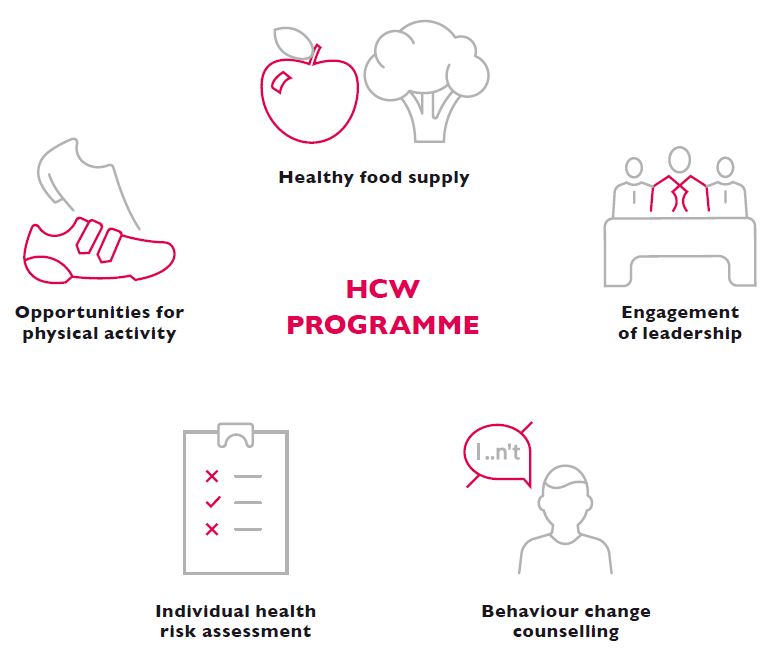A love for the people she works with and a desire to see them making healthy choices to prevent and control chronic diseases, is what motivated Dr Darcelle Schouw to focus her PhD studies on running a workplace health promotion programme at a commercial power plant in the Western Cape.
The results have been highly rewarding and she recently graduated from Stellenbosch University's Faculty of Medicine and Health Sciences.
Schouw, who has worked as a biokineticist in the plant's medical centre for the past 20 years, introduced the programme Healthy Choices at Work (HCW) four years ago. According to her the programme has been life-changing for the participants.
By encouraging healthy eating, exercise and conscious lifestyle decisions, the programme has considerably lowered health risk factors among workers. And, as an ongoing project, it will improve health even more in the future.
According to the abstract of Schouw's PhD titled “How to transform the workplace environment to prevent and control risk factors associated with non-communicable chronic diseases", these diseases are major causes of premature deaths in South Africa.
Schouw's study designed, developed, implemented and evaluated the HCW programme.
“The programme focused on healthy food supply, opportunities for physical activity, individual health risk assessment and behaviour change counselling, as well as engagement of the leadership. The study used novel methods and the lessons learnt can be transferred to similar workplace settings," according to her abstract.
Several deaths a call to action
Schouw introduced the HCW programme at the commercial power plant between November 2015 and December 2017. She was inspired to start the programme following the death of eight employees in consecutive months due to non-communicable diseases (NCDs).
“I knew them. Some of them were my age. At the end of the year, we put up a collage of everybody who had passed on. It was the first time we had had somebody die every month. It was a call for action."
Schouw set about inviting 11 respected, influential employees in managerial and key positions to join a cooperative inquiry group to design and implement the HCW programme to encourage others in following healthy lifestyles. “I called them my dream team."
Schouw's proposal to management to implement the programme was endorsed and the healthy choice was made the easy choice by transforming the workplace environment.
Health risk assessments were conducted, which included cholesterol, blood pressure and other tests on staff members, that were repeated at the end of 2015, 2016 and 2017.
“In conjunction with that, we changed the subsidised meals into healthy options. We removed the salt and prepared it in more healthy ways with the help of a dietician. We made fruit available for free, which resulted in increased fruit and vegetable consumption. We organised talks on health and set up physical activities, including running, walking, cycling and table tennis events."
Findings
Turning to her findings, she said the HCW programme was associated with “clinically significant improvements in behavioural, metabolic and psychosocial risk factors for NCDs.
“This study shows a reduction in alcohol use, an improvement in fruit and vegetable intake, an increase in physical activity levels, as well as improving metabolic risk factors for blood pressure and cholesterol over two years. It also illustrates the potential of health promotion in the workplace to complement interventions in the health services and community. Workplace-based interventions could make a substantial contribution to decreasing the NCD burden of disease in South Africa. This study contributes to research from low- and middle-income countries (LMICs) on the effectiveness of HCW for reducing risk factors for NCDs.
“The study also suggests that the HCW programme is a highly affordable intervention. Significant improvement in risk factors for NCDs was seen, with minimal incremental costs to the company. The cost to implement the intervention was approximately $1 per individual, which is important for LMICs where resources are constrained."
Team work inspiring
Schouw said the most inspiring aspect of her work was working with a diverse set of professionals from different backgrounds. “We worked as a team from start to completion. The team offered their personal time and we were committed to seeing lives changed. The team led the people in healthy eating, exercise and habits. Individual lives were changed and it was evident where people queued for healthy meals and more staff engaged in physical activity. The change is visible on the plant. The NCD profile of the individuals changed. It was so rewarding! And, it was fun doing it!"
Schouw, a mother of three teenagers who loves camping, being in nature and writing poetry, is a regular inspirational speaker at women's conferences.
She would like to see the HCW programme adopted in other workplaces and the health sector, “specifically the national Department of Health".

